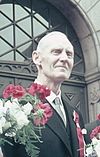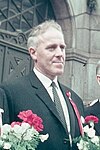The politics of Norway take place in the framework of a parliamentary, representative democratic constitutional monarchy. Executive power is exercised by the Council of State, the cabinet, led by the Prime Minister of Norway. Legislative power is vested in both the government and the legislature, the Storting, elected within a multi-party system. The judiciary is independent of the executive branch and the legislature.

John Smith was a Scottish Labour politician who served as Leader of the Opposition and Leader of the Labour Party from July 1992 until his death from a heart attack in May 1994.

The Storting is the supreme legislature of Norway, established in 1814 by the Constitution of Norway. It is located in Oslo. The unicameral parliament has 169 members, and is elected every four years based on party-list proportional representation in nineteen multi-seat constituencies. A member of Stortinget is known in Norwegian as a stortingsrepresentant, literally "Storting representative".
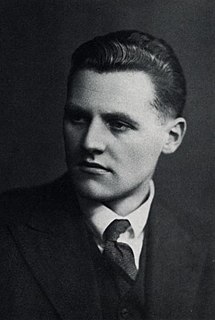
John Daniel Lyng (help·info) was a Norwegian politician from the Conservative Party. He was the 24th prime minister of Norway from 28 August to 25 September 1963 in a coalition government consisting of the Conservative, Centre, Christian Democratic, and Liberal parties. It was the first government in 28 years that was not headed by the Labour Party.
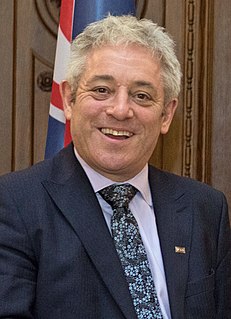
John Simon Bercow was a British politician who was Speaker of the House of Commons from 2009 to 2019, and Member of Parliament (MP) for Buckingham between 1997 and 2019. A member of the Conservative Party prior to becoming Speaker, he was the first MP since Selwyn Lloyd in 1971 to be elected Speaker without having been a Deputy Speaker. After resigning as Speaker in 2019 and opting not to seek re-election as MP for Buckingham in the 2019 general election, Bercow left Parliament. In 2021, he joined the Labour Party but was suspended in 2022.

West Bromwich East is a constituency that is represented in the House of Commons of the UK Parliament by Nicola Richards of the Conservative Party, who was first elected at the 2019 United Kingdom general election.

West Bromwich West is a constituency represented in the House of Commons of the UK Parliament since 2019 by Shaun Bailey, a member of the Conservative Party.

The Kings Bay Affair was a political issue in Norway that reached its apex in 1963 and brought down the government of Einar Gerhardsen and formed the basis for non-socialist coalition politics in Norway that persisted to the end of the 20th century. The affair was a dramatic episode in Norwegian history that portended the end of the Gerhardsen dynasty and the emergence of a more articulate and coherent political alternative in the non-socialist camp. It is also credited with galvanizing the radical socialist wing of Norwegian politics in time for the EU debate nine years later.

Nils Hønsvald was a Norwegian newspaper editor and politician for the Labour Party. He was one of the leading figures in Norwegian politics from 1945 to 1969. He served as President of the Nordic Council in 1958 and 1963.

Olav Gunnar Ballo is a Norwegian former politician for the Socialist Left Party (SV). Ballo changed party to Arbeiderpartiet in 2011. Ballo was elected to the Norwegian Parliament from Finnmark in 1997. He studied medicine at University of Würzburg, and has worked as a medical doctor. Ballo represented SV in Alta municipality council from 1991 to 1997. Ballo was the leader of the National Forensics Institute in Norway between 2009 and 2010/2011.
Gunnar Skaug was a Norwegian politician for the Labour Party (Ap). Born in Sarpsborg, Skaug was elected to the Norwegian Parliament from Østfold in 1969, and was president of the Odelsting from 1993 to 2001. He sat the term from 1973 to 1977 as a deputy representative.
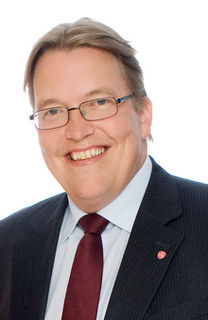
Sverre Myrli is a Norwegian politician for the Labour Party.
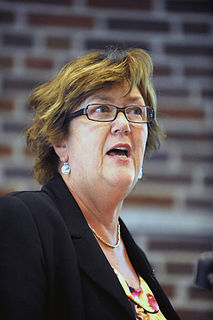
Berit Brørby is a Norwegian politician for the Labour Party. She was President of the Nordic Council in 1998.

The Lyng Cabinet governed Norway between 28 August 1963 and 25 September 1963. It was the first in 28 years not to be led by the Norwegian Labour Party. It was a centre-right coalition government of the Conservative Party, Centre Party, Christian Democratic Party and Liberal Party led by John Lyng of the Conservative Party. It had fifteen members, of which five were from the Conservative Party, four were from the Centre Party, three were from the Christian Democratic Party and three were from the Liberal Party. Karen Grønn-Hagen was the cabinet's only female member.
In Norway, a state secretary is a partisan political position within the executive branch of government. Contrary to the position secretary of state in many other countries, a Norwegian state secretary does not head his or her ministry, rather, they are second in rank to a minister. Resembling a de facto vice minister, the state secretary, however, cannot attend a Council of State, and does not act as a temporary minister in case of illness or other leave of absence.
The Panel of Chairs are members of the House of Commons of the United Kingdom responsible for chairing public bill committees and other General Committees, as well as debates in Westminster Hall, the parallel debating chamber. The three Deputy Speakers, who are automatically members, are responsible for chairing Committees of the Whole House. Other members may act as temporary chairs of Committees of the Whole House. The Panel is not itself generally thought of as a committee, but it does have the power to meet to consider matters relating to procedure in the general committees and report its findings to the House of Commons.

The 2019 United Kingdom general election was held on Thursday, 12 December 2019. It resulted in the Conservative Party receiving a landslide majority of 80 seats. The Conservatives made a net gain of 48 seats and won 43.6% of the popular vote – the highest percentage for any party since 1979.

The inaugural North of Tyne mayoral election was held on 2 May 2019 to elect the first Mayor of the North of Tyne. The area is made up of Newcastle upon Tyne, North Tyneside and Northumberland. Subsequent elections will be held every five years.
This page is based on this
Wikipedia article Text is available under the
CC BY-SA 4.0 license; additional terms may apply.
Images, videos and audio are available under their respective licenses.

